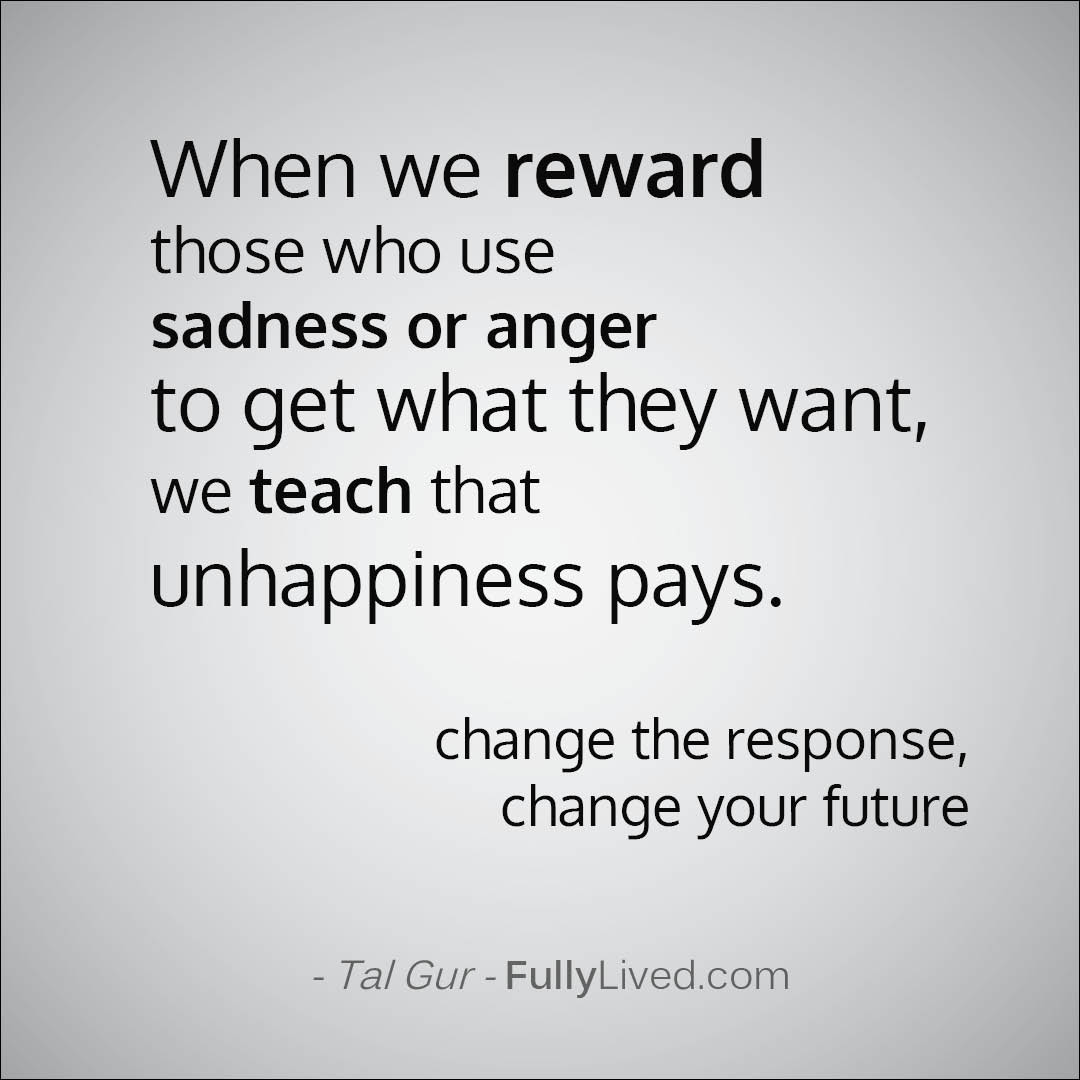When we reward those who use sadness or anger to get what they want, we teach that unhappiness pays. Change the response, change your future.
Imagine a world where every time someone throws a tantrum or sheds a tear, they're handed a reward—a candy, a pat on the back, or even a promotion. Sounds absurd, doesn't it? But think about it, how often do we inadvertently reinforce negative behavior in ourselves and others? This quote shines a light on a fundamental truth: by rewarding negativity, we're essentially endorsing a life where sadness and anger become currency. It's like planting seeds of weeds in a garden and expecting roses to bloom.
Think of it this way: imagine you're training a mischievous puppy. Every time it misbehaves—chewing on furniture, barking excessively—you give it a treat. What do you think will happen? That's right, the puppy will associate bad behavior with positive outcomes, and it will continue to act out. Now, replace the puppy with humans, and the treats with attention, validation, or material rewards. The principle remains the same. If we reward negative emotions or actions, we're setting ourselves up for a future where those negative patterns persist.
But here's the silver lining: the power to change this cycle lies within us. It's all about altering our responses. Instead of feeding into someone's anger or sadness, we can choose empathy, understanding, and positivity. Picture a different scenario with the puppy: whenever it behaves well—sitting calmly, following commands—you reward it. Soon enough, the puppy learns that good behavior yields better results. Similarly, when we respond positively to positivity, we pave the way for a brighter future.
Consider this analogy: life is like sailing a boat in the ocean. Sometimes, storms brew, and waves crash against your vessel. It's easy to succumb to fear, frustration, or despair in such moments. But imagine if every time you let those negative emotions steer your boat, you were rewarded with smoother waters or a shortcut to your destination. You'd never learn to navigate the storm, and you'd miss out on the growth and resilience that come from overcoming challenges. By changing our response to adversity—steadying the helm, adjusting the sails—we not only weather the storm but emerge stronger and more capable.
Rewiring our responses isn't just about individual growth; it's about shaping a collective mindset. Think of society as a tapestry woven from individual threads of behavior and attitude. When one thread promotes negativity, it weakens the fabric, making it susceptible to tearing. But when we consciously choose to reward positivity and resilience, each thread strengthens the whole, creating a tapestry that can withstand the test of time.
Now, let's bring it back to you, the reader. Reflect on your own life. Have there been times when you've rewarded negativity in yourself or others? Maybe you've indulged in self-pity or lashed out in anger, only to find temporary relief or even validation. It's okay; we've all been there. But now that you're aware of this pattern, what will you do differently? How can you start changing your responses to negativity, both in yourself and in those around you?
Remember, every choice you make, every response you give, shapes the course of your future. So, as you navigate the unpredictable waters of life, ask yourself: am I reinforcing negativity, or am I steering towards a brighter horizon?
* To gain more inspiration and motivation for your personal growth journey, I recommend visiting my SMART goals page, which offers a wide range of goal ideas to help you establish new aspirations and achieve greater success in life. This list was crucial in the development of my own life goals list, consisting of 100 goals that I pursued for ten years.
Chief Editor
 Tal Gur is an author, founder, and impact-driven entrepreneur at heart. After trading his daily grind for a life of his own daring design, he spent a decade pursuing 100 major life goals around the globe. His journey and most recent book, The Art of Fully Living, has led him to found Elevate Society.
Tal Gur is an author, founder, and impact-driven entrepreneur at heart. After trading his daily grind for a life of his own daring design, he spent a decade pursuing 100 major life goals around the globe. His journey and most recent book, The Art of Fully Living, has led him to found Elevate Society.






















